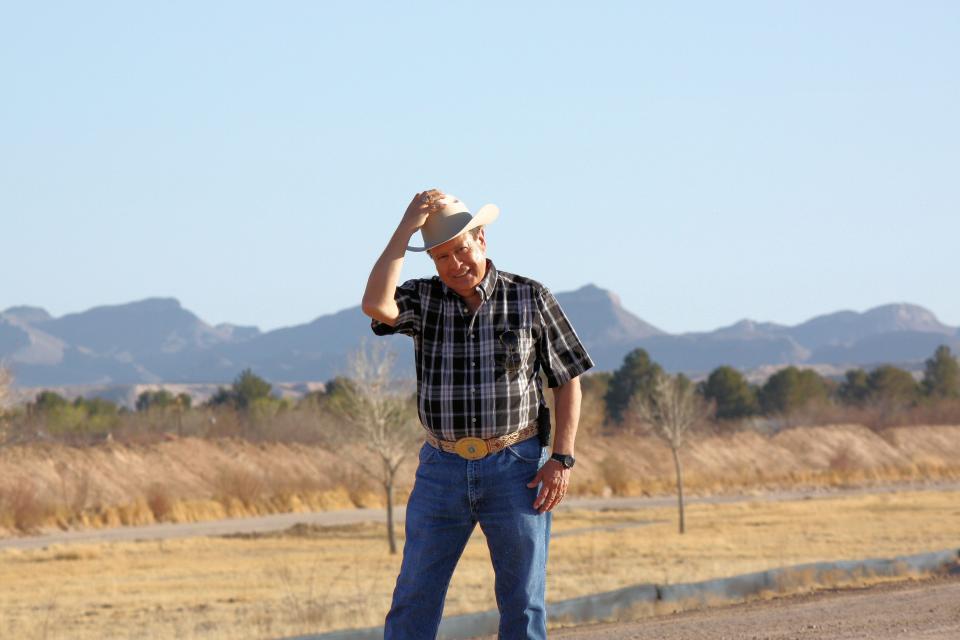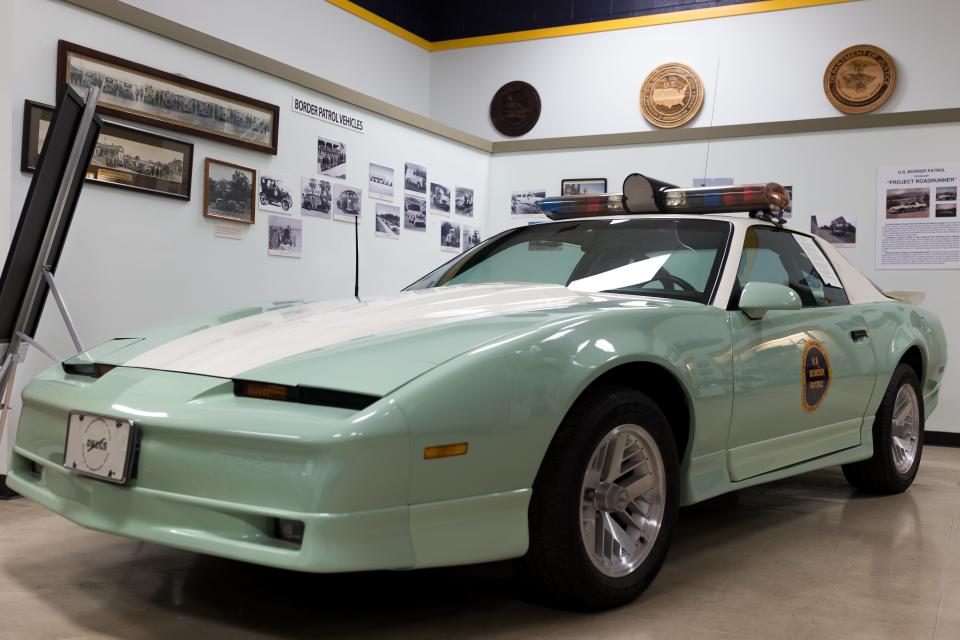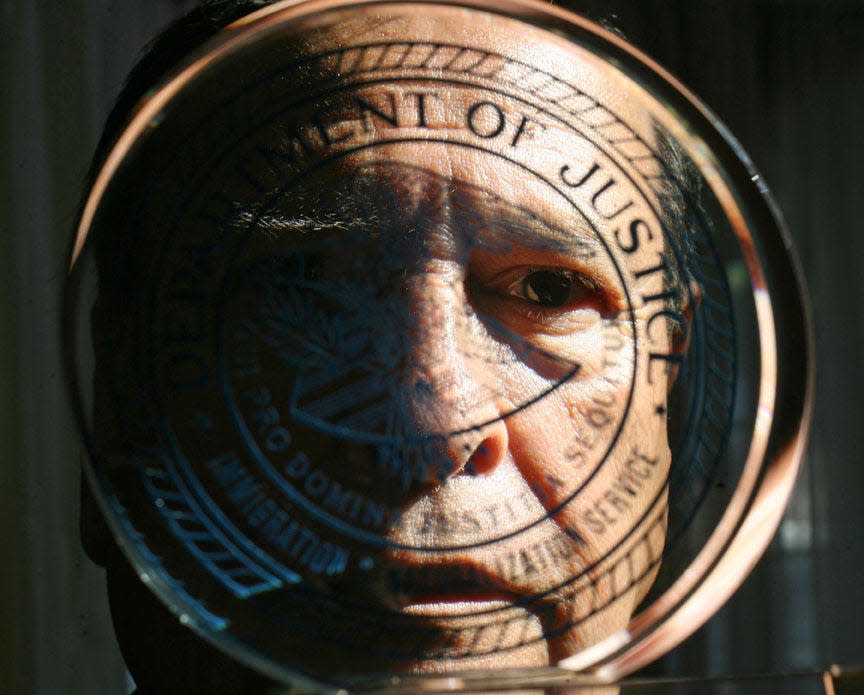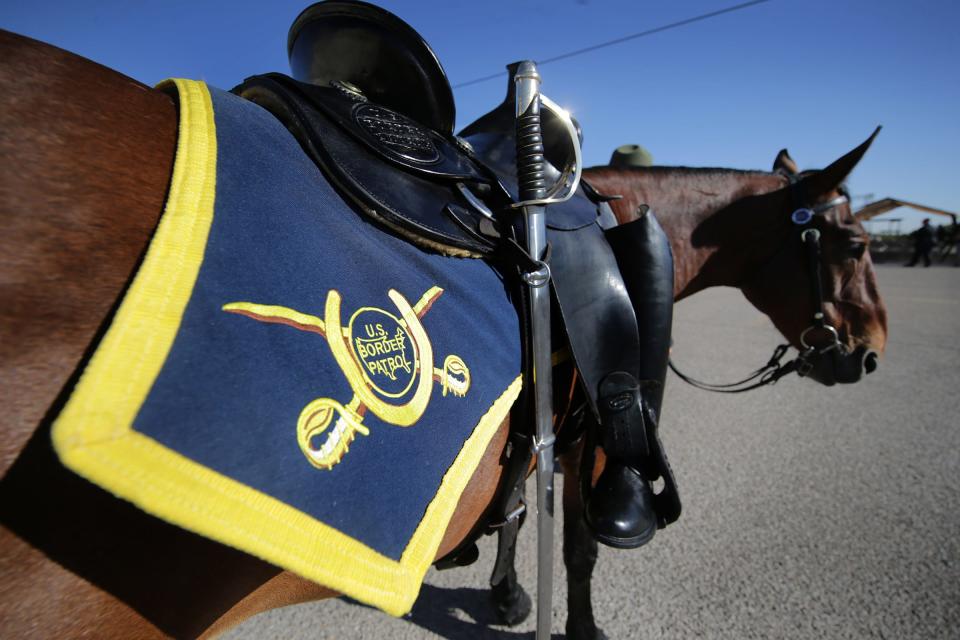The life and legacy of 'Don Chuy.' Undercover El Paso Border Patrol agent mourned
A longtime El Paso border lawman recognized for his undercover work infiltrating the dangerous world of drug traffickers in being mourned by his family, friends and former colleagues.
Jesus P. Carrillo was an undercover agent with the U.S. Border Patrol who portrayed a swaggering Mexican narco cowboy known as "Don Chuy" wheeling in big-time marijuana and cocaine deals in the Texas and New Mexico borderlands and beyond for more than a dozen years.
In 1996, the danger culminated when a Juárez drug cartel hit team was arrested near his El Paso home in a foiled kidnapping and murder plot. Carrillo was with the Border Patrol from 1971 until his retirement in 1998.
Carrillo died peacefully at the age of 80 on May 18, surrounded by family at home because of medical issues following a fall, his son, Carlos Carrillo, said.

"Don Chuy" Carrillo's career highlighted the dangers of the ever-evolving drug war and rivalries among federal agencies. His death comes as the U.S. Border Patrol celebrates its 100th anniversary and its roots in El Paso.
"He was very proud of his family, very patriotic. He was a proud American and he loved the U.S. Border Patrol," said Carlos Carrillo, a retired El Paso police detective now with the Las Cruces Police Department.
"I think his legacy was that he was able to portray himself and able to infiltrate deep into the cartel organizations," his son said.
Funeral services for retired Border Patrol Special Agent Jesus Carrillo
Visitation will be from 5 to 9 p.m. with a rosary at 6 p.m. on Wednesday, May 29, at Sunset Funeral Homes, 9521 North Loop Drive.
A funeral Mass will be at 10:30 a.m. on Thursday, May 30, at St. Patrick Cathedral, 1118 N. Mesa St., followed by a graveside service at 1 p.m. at Fort Bliss National Cemetery, 5200 Fred Wilson Ave.
A U.S. Border Patrol honor guard and a police escort will be part of the funeral proceedings, the Carrillo family said.
Born in Mexico. Made in Texas
Jesus Carrillo was born and raised in the Mexican state of Chihuahua and immigrated to the United States as a child. He graduated from the former El Paso Technical High School, nicknamed "La Tech," and attended the University of Texas at El Paso, his family stated in an obituary.
After volunteering for the U.S. Army to serve in the Vietnam War, Carrillo joined the U.S. Border Patrol in 1971, starting his career in Del Rio, Texas. He would go on to have various roles in El Paso and Los Angeles, including as an Immigration and Naturalization Services (INS) special agent investigating human smuggling.
Don Chuy: Undercover on the border
Jesus Carrillo was a mild-mannered family man who didn't drink. As a child, he had seen his father stumbling drunk and swore that he would never touch alcohol, he told the El Paso Times in a 2010 interview.
By the 1980s, Carrillo was working undercover, infiltrating border immigrant smuggling groups that were evolving into the modern-day Mexican drug cartels, which had found out they could make more money trafficking in marijuana and cocaine than smuggling migrant laborers.
Don Chuy could swagger into border cantinas armed with charisma in his gold jewelry, a Stetson cowboy hat and a .380-caliber handgun hidden in one of his cowboy boots. (He would secretly dump the beer he was pretending to drink while undercover, he had said.)

"We started buying 5 pounds here, 50 pounds there, 100 pounds there. It started in little amounts and it went from there," he told the El Paso Times in 2010.
Long hair and earrings were for chump penny dealers. The Don Chuy persona, who didn't speak English, was a Mexican high roller. He had other aliases, Fernando Rey, Emilio Canales and others — each with his own identification and back story.
"I never dressed down," "Don Chuy" Carrillo said. "The way I saw it, if you are all raggedy with a beard and long hair they are not going to sell you $100,000 worth of drugs."
"Once they started saying 'Don Chuy,' they are already putting themselves down to me," he said of his moniker. Don is a term of respect.
Cellphones and rodeo belt buckles
With the advent of cellphones, the trickery got more elaborate. Carrillo would call telephone numbers found in the wallets of drug suspects to set up more deals and busts. Carrillo could alter his voice to become different people, such as an elderly man and a woman.
During one case, Don Chuy wore a rodeo belt buckle decorated with an El Paso police badge just to troll a drug dealer, who kept looking down at the buckle and up at Chuy's face before the bust went down, Jesus Carrillo said in 2010.
Many of the investigations were alongside New Mexico State Police and El Paso police narcotics detectives. Some cases were as far away as Canada. According to files kept by his family, Carrillo is estimated to have confiscated more than $57 million in drugs during his career.
'All I can do is make a small dent to it'
The career of Don Chuy highlights how things have changed and remained the same on the U.S.-Mexico border over the last 50 years, his son, Carlos Carrillo, said.
"He would tell me, 'I never want you to fall for drugs. We want to get them off the streets. All I can do is make a small dent to it,'" Carlos Carrillo recalled his father telling him.
Border: Should Americans be worried about the border? The first Texas border czar says yes.
Over the decades, drug traffickers on the Mexican border have gone from marijuana to heroin to cocaine and now fentanyl, Carlos Carrillo noted.
In the 1970s, "cartels were involved in (immigrant) smuggling and the cartels found out they could make more with drugs. Now, it's the evolution of smuggling and trafficking. They have gone back to human smuggling," Carlos Carrillo said.
Juárez cartel assassination attempt
The Carrillo family has claimed the success of Don Chuy spawned "professional jealousy" from other federal agencies and the floating of unfounded rumors that he was dirty, especially after he allegedly embarrassed the DEA by sniffing out an undercover "banker" who was meeting to set up a drug deal with the undercover "Don Chuy" at the Jack in the Box restaurant at Fox Plaza.
In the summer of 1996, things came to a head when the Juárez drug cartel, at the time the most powerful of the Mexican cartels, placed a target on Don Chuy.

Cartel hit men followed Jesus Carrillo for two weeks and watched his home. One day, two men rang the doorbell, trying to sell his wife a vacuum cleaner and asking if her husband was home.
An FBI SWAT team arrested the hit squad at a park near Carrillo's home. The men had orders to kidnap him, take him to Juárez and skin him alive. The hit men would have been paid $1,000 and apparently did not know he was a U.S. federal agent. They were convicted and sent to prison.
More: FBI arrests woman accused of ordering US guns for Mexico border smugglers
Later, a man called Carrillo's home phone and asked for Chuy. In Spanish, he told him that he knew Carrillo was a federal agent and that he owed the cartel $800,000. Carrillo told him that any money or drugs the cartel had lost was because of a legitimate bust.
When Carrillo told his supervisors about the call, he was ushered into a meeting with FBI agents, Border Patrol supervisors and DEA officials. They finally told him about the threat to his life.
After the attempted hit, Carrillo was transferred to a desk job in Dallas and moved around to other locations for his safety. He was sent as far away as being an attaché to the U.S. Embassy in South Korea. He even made a heroin bust while in South Korea, his son added.
Eventually, he returned home to El Paso.
The legacy of Don Chuy
The legend of Don Chuy lives on in his family and among the stories of the Border Patrol. He developed a strong sense of justice and community from an early age, his family said.
The Carrillo family said they are grateful for the outpouring of support following the death of their family patriarch.

Jesus Carrillo is survived by his wife of 59 years, Jesusita Carrillo. The couple had three sons, Carlos, Luis and Jaime Alberto, who passed away. Jesus Carrillo is also survived by seven grandchildren and one great-grandchild.
A grandson is a third-generation law enforcement officer as a detective with the Crimes Against Persons Unit of the El Paso Police Department.
In 1994, U.S. Attorney General Janet Reno presented Jesus Carrillo with an award for excellence in law enforcement. In 2010, he was honored by a Congressional proclamation by U.S. Rep. Silvestre Reyes, D-Texas, who was once Carrillo's boss in the Border Patrol.
This article originally appeared on El Paso Times: 'Don Chuy' Carrillo, undercover El Paso Border Patrol agent remembered

